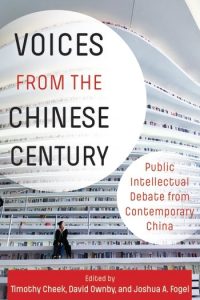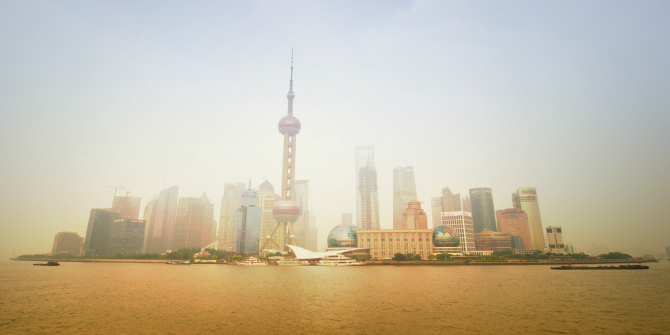In Voices from the Chinese Century: Public Intellectual Debate from Contemporary China, Timothy Cheek, David Ownby and Joshua A. Fogel present fifteen essays by leading Chinese public intellectuals and academics written on Chinese politics and philosophy since 2000. This collection is an insightful snapshot of China’s intellectual culture from what could be just the beginning of the Chinese century, writes Rory Gillis.
Voices from the Chinese Century: Public Intellectual Debate from Contemporary China. Timothy Cheek, David Ownby and Joshua A. Fogel (eds). Columbia University Press, 2020.
 The recent spread of COVID-19 and the importance attributed to the Chinese response has once again affirmed the political and strategic significance of the world’s most populous country. Nonetheless, though China’s economic and political power has become impossible to ignore, international discussions have remained considerably less well-informed about the country’s intellectual culture. Timothy Cheek, David Ownby and Joshua Fogel’s Voices from the Chinese Century attempts to correct this deficit by presenting fifteen essays from Chinese intellectuals and academics written on Chinese politics and philosophy after the turn of the millennium.
The recent spread of COVID-19 and the importance attributed to the Chinese response has once again affirmed the political and strategic significance of the world’s most populous country. Nonetheless, though China’s economic and political power has become impossible to ignore, international discussions have remained considerably less well-informed about the country’s intellectual culture. Timothy Cheek, David Ownby and Joshua Fogel’s Voices from the Chinese Century attempts to correct this deficit by presenting fifteen essays from Chinese intellectuals and academics written on Chinese politics and philosophy after the turn of the millennium.
The book portrays China as being at something of an intellectual crossroads in the Xi Jinping era, caught between the three ‘thought streams’ of Liberalism, the New Left and New Confucianism. In the introduction and the opening essay, the importance of these discussions in shaping China’s intellectual self-understanding quickly becomes apparent, though the editors also aim for their book to demonstrate the relevance of Chinese theory to global debates.
The section containing liberal voices opens with Liu Qing’s essay ‘Liberalism in the Chinese Context’, in which Qing offers an insightful international dimension to liberal political theory by realistically assessing the doctrine’s prospects in China. He begins his argument by showing that many of the grounding intuitions supporting liberalism can also be found in China, from sources as diverse as Maoist egalitarianism and economic individualism. Nonetheless, liberalism must adapt to China, in particular by overcoming its bias towards Enlightenment rationalism in order to accommodate traditional spiritual cultures. Furthermore, Qing claims that liberalism’s commitment to equal respect demands that it goes beyond simple state neutrality towards the active celebration and protection of different ways of life, all the while hinting at the importance of people’s cultural attachments. These hints are given later substance in Chapter Five, which presents Guo Yuhua’s interview about the cultural impact of Chinese communism, in which stories are told of rural villagers being unable to perform religious ceremonies without fear of suppression from the Chinese Communist Party.
Cai Xia’s argument that the historic mission of the Chinese Communist Party is the establishment of a constitutional democracy provides perhaps the most eye-catching conclusion in the section on liberal voices. In contrast to the other essays in the section, Xia’s rhetoric is self-consciously oriented towards those sympathetic towards the Communist Party, evidenced by numerous references to the Marxist-Leninist-Maoist canon, as well as to the writings and speeches of Deng Xiaoping, Hu Jintao and Xi. As a former Professor at the Central Party School in Beijing, Xia’s words carry weight as coming from ‘a notable establishment intellectual’ (134), and the essay remains one of the few liberal pieces in the book freely available on the Chinese internet (135). She argues that, although the party-state legitimately repressed the opinions of the people to promote economic growth, the principles underlying Marxism now demand a move towards democracy. Xia is well-justified in referencing Marx and Lenin’s sparse hints at a democratic communist future, and there is no shortage of appeals to the importance of democracy within Mao’s work. The essay makes engaging use of China’s own history and theory, and certainly represents more than the dressing-up of liberal conclusions in party-speak.

Image Credit: Crop of ‘National Library of China – Reading room’ by Lëa-Kim Châteauneuf licensed under CC BY SA 2.0
The tone of the book changes completely as the reader enters the section of essays from authors of the New Left, whose members variously castigate liberalism as the ‘shared moral cancer of the Chinese intelligentsia’ (211) and make defences of ‘enlightened autocracy’ (203-4). The most theoretically substantive defence of (something approaching) the Chinese political system appears in Wang Shaoguang’s essay that juxtaposes the ‘representative democracy’ found in the West with Chinese ‘representational democracy’.
In representative democracy, politicians are elected by voters to directly voice the views of their constituents. According to Shaoguang, this model is focused on procedural constraints and the subsequent protection of political rights and freedoms. In contrast, Chinese representational democracy is advocated. Representational democracy is focused on fulfilling the needs of the people and producing substantive democratic outcomes, such as greater economic equality. A conceptual framework for representational democracy is then found in the Maoist concept of the ‘mass line’, which emphasises the function of Communist Party ‘cadres’ to remain part of the public and to be continually attentive to its desires. The essay identifies important problems in the current functioning of the representative model: namely, in holding politicians accountable for group decisions and the disconnect of representatives from their voters. Shaoguang’s failure to apply the same level of scrutiny to representational democracy hinders any efforts at an exportable alternative to representative democracy, though he articulates another theoretical opportunity for the democratisation of the Chinese system.
The section including writings from the New Confucians is the most challenging, though it is at times uniquely rewarding. The authors and themes referenced here are likely to be the most unfamiliar to Western readers, giving thinkers the possibility to introduce new concepts and ideas. The section’s opening chapter contains a transcript from a debate between Chen Ming, Gan Yang, Tang Wenming, Yao Zhongqiu and Zhang Xiang focused on the interpretation of Confucius developed by the scholar Kang Youwei. Although at times the debate loses general interest as it stalls on nuances of scholarly interpretation, it regains non-specialist relevance when dealing with broader themes such as the relation of education to political reform. The readability of the chapter also benefits from the debate between different authors, a format that would have worked well in other sections of the book. The great importance of Confucianism in Chinese culture is then competently documented in Chen Lai’s essay found in Chapter Fourteen.
Overall, Voices from the Chinese Century clearly demonstrates how Chinese political thought is of interest to global theoretical debates by expanding and challenging our understanding of political concepts and ideologies. The translations make the work accessible without sacrificing nuance, and an interesting choice of essays offers personal and anecdotal breaks from political theorising. Translators’ introductions at the beginning of each essay give a helpful sense of the relevant debate and its broader (often fraught) relationship with Chinese politics. The book’s audience should certainly not be restricted to academics, and it functions as an insightful snapshot of China’s intellectual culture from what could be just the beginning of the Chinese century.
Note: This review gives the views of the author, and not the position of the LSE Review of Books blog, or of the London School of Economics and Political Science.







